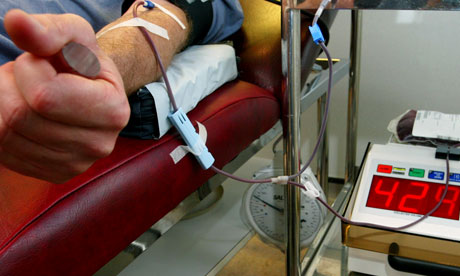
The ban on sexually active gay men giving blood is based on "stigma" rather than scientific evidence and is preventing many volunteers from donating blood at a time of shortage, Liberal Democrats were told on Tuesday.
Speakers at a debate on the blood ban at the party's conference in Birmingham described the restrictions as "daft and discriminatory".
The Department of Health announced recently that some restrictions on gay men giving blood will be lifted from 7 November. Dij Davies, a graduate from West Lothian, told delegates this was just "a ban by another name" because sexually active gay men were still barred from donating blood.
A lifetime ban on blood donation by men who have had sex with another man was put in place in the UK in the 1980s in response to the spread of Aids and HIV. But following a review by the advisory committee on the safety of blood, tissues and organs, men who have not had sex with another man within the last year will be able to donate if they meet certain other criteria.
The recommendation has been accepted by the health ministers in England, Scotland and Wales, but critics say the changes do not go far enough and are unscientific, based on membership of a social grouping rather than the risk posed by the behaviour of an individual.
A Lib Dem motion on the issue estimated that between 1 and 2 million extra people would be eligible to donate blood if the rules were changed, based on statistics suggesting 6% to 10% of the male population is gay or bisexual. It called on the outright ban and 12-month deferral to be lifted and for new criteria and restrictions to be drawn up with medical experts to reflect the risk posed by the behaviour of "every individual". It also said blood donations should be subject to better screening to ensure minimal risk of transfusion-transmitted infections.
Davies shared with the audience his own experience of being prevented from donating blood for a life-saving transfusion to his mother because of his sexuality. The son of a friend who served in the Metropolitan police gave his blood, alongside a number of fellow officers who offered to help. "But I wasn't allowed to donate. Her own son. I wasn't even asked – all because I am gay," he said.
He cited the case of a 74-year-old man who had donated blood 984 times because he had an antibody in his plasma that stopped babies dying from a form of severe anaemia. "If he was gay, 2.2 million babies would now be dead," he said.
Davies quoted a pre-general election interview with David Cameron in a leading gay magazine, in which he said of the ban that "logic would dictate that it is time to change". Reversing the ban was one of Nick Clegg's four key gay rights reforms, Davies said.
"The new rules are better – but they are still fundamentally flawed and do not adequately safeguard the blood bank," he told delegates. "The deferral does not take into account whether men who have sex with men are using a condom or not; it doesn't separate those in a relationship from those who engage with casual partners; and, crucially, it asks no such questions of the heterosexual population at all."
He also questioned why same-sex male partners who use condoms are seen as just as high risk as intravenous drug users or those who sleep with sex workers.
"If safe sex cannot safeguard our blood supply, then why is it that every international HIV organisation has been telling us for years that safer sex can stop the spread of HIV and help save lives? Quite simply, either safe sex works, or it doesn't," he said.
Hugh Annan, a delegate from Brussels, described the ban as "daft, unscientific and discriminatory". Martin Shapland, from Vauxhall, south London, said the original ban was a "hangover of a Thatcherite stigma when HIV was seen solely as a gay disease", but that the majority of people diagnosed in current times were heterosexual.

